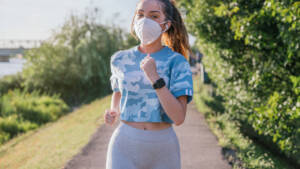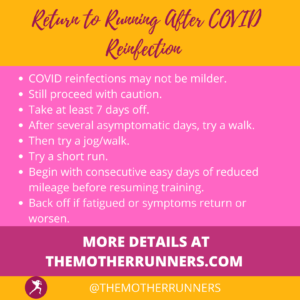Ah, we are here again. Another round of a COVID variant that’s getting people sick everywhere. The athletes I coach seem to be a good barometer for what COVID’s doing. Today, many of them and their families are getting COVID reinfection, even after having it only weeks or months ago.
What is COVID reinfection? When referring to COVID reinfection, I mean that person was infected, recovered, and then later became infected again with COVID.
For quite a while, it was thought that there was a silver lining to getting COVID—it gave you immunity to getting COVID again—at least for a time.

Related: When Can I Start Running After Covid?
However, studies show that the risk of reinfection is higher with each new variant. You may be protected against that particular strain for a time period, but not against other variants.
When I got infected with COVID in March of 2022, I was told by healthcare professionals that I had immunity for six months. I was also told that if we got reinfected with COVID, it would be a milder case.
Related: Running with an Elevated Heart Rate After COVID
Unfortunately, neither one of these statements is true.
- You can get COVID again after having it—even getting COVID back-to-back, and
- If you get COVID again, the case could be more severe, not less.
Sigh.
For this article, I interviewed world-renowned physician and scientist Dr. William Li. I also look at the latest research and polled fellow mother runners to get a better picture of what to expect if you get a reinfection of COVID and how to return to running if you do get covid again.
My main goal for this article is to answer:
- Can you get COVID again? How quickly can you get reinfected with COVID?
- Do you have any immunity to COVID after getting it?
- If you get COVID again, will the COVID reinfection be milder? And:
- How to return to running after getting COVID again
I have already written about how to return to running after COVID and why you may have an elevated heart rate after COVID.
Please refer to those articles for more information on how to return to exercise after COVID and what the virus does to your nervous system to affect your heart rate.
How fast can you get COVID again?

Unfortunately, it seems you can become reinfected with COVID soon after getting it.
According to the CDC, even if you have antibodies from the vaccine or a past COVID infection you can still get COVID again. “SARS-CoV-2 may become infected after vaccination (vaccine breakthrough infection) or after recovering from a past infection (reinfected),” the agency states.
“The reason is there are several sub-variants of the virus floating around out there, and your immunity caused by any single one of them may not protect you against the other versions,” explains Dr. Li. “The BA5 sub-variant, for example, is the current dominant variant and can infect a person who had other variants in the past.”
The idea that you are immune from COVID for 90 days after an infection is outdated and not true anymore, he says.
How long does immunity last after COVID-19?
You do not have immunity after getting COVID-19 as you can become reinfected with other COVID-19 variants. With each new variant in existence, the chances of you getting COVID reinfection increases.
“Being fully vaccinated and boosted and having had COVID in the past offers the greatest protection against current infection — as long as you are taking reasonable precautions,” advises Dr. Li, such as staying away from large crowds, wearing a mask, and washing your hands.
Will my COVID infection be milder if I get it a second or third time?
No, your COVID infection may not be milder if you become reinfected. The different COVID-19 variants infect people differently and affect people differently due to their viral load and immune response.
In fact, there are some indications that COVID reinfection may be more severe, according to Li.
“There are clear signs from clinical research that each time you get COVID, your chances of getting sicker increase (not decrease), and the chances you’ll develop long COVID, or suffer as much as a year later from an elevated risk of heart disease and stroke rises dramatically,” warns Dr. Li.
Sigh. Again.
How is COVID reinfection is affecting runners?
I did an unofficial poll on Instagram to take a pulse on how COVID reinfection has affected runners:
- About half of the hundred respondents said their case was milder.
- About a quarter said it affected them differently.
- And another quarter said their COVID reinfection was worse than their first infection.
A couple of runners noted that taking a steroid such as prednisone or getting a steroid shot helped resolve lung and heart symptoms. Prednisone also helped me recover after experiencing lingering heart and breathing symptoms from COVID.
Can I get long COVID even if my case is mild?

Yes, you can get long COVID even if you had mild symptoms from COVID or COVID reinfection. Indeed, long COVID seems to be becoming more common as more people are infected with the virus.
Dr. Li advises: “If you had COVID already, avoid another bout. If you’ve never had it, double down on your efforts to dodge it.
‘This is an insidious virus that causes a new form of human disease we don’t fully understand.
While the milder, cold-like symptoms tend to be fairly innocuous, those of us in the medical community doing the research are concerned about the serious longer-term consequences that are starting to emerge as part of the picture.”
In other words, even though we are tired of COVID, we still cannot let our guard down. Yes, it is something we must live with. But it is also something we still need to avoid since, even after all this time, there are still so many unknowns.
You may be wondering now: How do I return to running after getting COVID twice (or more)?
Your plan to return to exercise after COVID reinfection is the same as after your initial COVID infection. You need to play it safe, listen to your body, and return gradually.
Fortunately, we do have some experience now on our side and have learned that when recovering from COVID, it is not the time to push it. Indeed, studies, including those on elite and professional athletes, show that “radical rest” is best and may help you avoid chronic symptoms or long COVID.
Related: 13 Tips to Nail Your Next Marathon
That is something runners do not want to hear, especially runners in the middle of a marathon cycle. Believe me, I know and I am personally guilty of playing mind games with myself to think that running isn’t hurting my recovery.
But, when dealing with COVID, even if it is that you got COVID a second time or third time, it may be helpful to think of it as you would dealing with a running injury. (And remember, it takes more than a week to start losing any significant amount of fitness.)
Related: 9 Steps to Return to Running After Injury
You wouldn’t dive right back into your training full throttle. You would start with walking, then wait a day to see how you feel, then try a jog/walk, then wait a day, then try a 30-minute easy run (or whatever is a very light running day for your fitness level), and progress slowly.
Returning to running after a COVID infection or COVID reinfection too soon can prolong symptoms and potentially put you at greater risk for long COVID.
The return to running after getting COVID reinfection will look different for everyone but there are two common threads:
- You should still return to running gradually. And:
- You should listen to your body.
It is my suggestion to give yourself one week off, no questions asked and then start making decisions about what your body can handle.
Related: Lessons Learned from My Running Injury
When should I stop running after having COVID again?
Only you know how you feel. And hopefully, with experience on your side after already having COVID, you know what symptoms to pay attention to and not push through.
You should back off on your training if you experience the following, for example:
- Extremely fatigued during or after a run.
- Extremely elevated heart rate or heart palpitations
- Breathing issues
- Symptoms worsen or return.
Get more detailed guidance on returning to running after COVID here.
Difficulty breathing and an elevated heart rate are very common after having COVID but that does not mean they should be ignored as they could still be a sign of something serious. So, get examined by a medical professional if you have these symptoms before resuming your running.
Your Return to Running Plan After a COVID Reinfection

Even though there are so many variables when it comes to COVID and COVID reinfection, here are some general guidelines for how to return to running based on how you feel!
It is advised by the sports medicine community to take at least 7 days off before resuming a graduated return to exercise. (Dr. Monica Verduzo-Gutierrez talks about this and the research behind it on a great Rambling Runner podcast episode).
If you took a week off and are several days symptom-free then:
- Try a day of a 30-minute walk.
- If you feel good, progress to a 30-minute easy run or run of half the distance of your usual base-building run and see how you feel.
- Take a rest day.
- If you feel good, you can repeat the 30-minute/shorter run.
- If you feel good, do several days of easy running before resuming your training or any training with intensity or long runs.
If you took more than a week off and are now several days symptom-free, follow the above steps, then when you can safely perform consecutive days of easy running:
- In your first week back, reduce your normal training load by 50 percent.
- In the second week, you can increase mileage up to 70 percent of your previous volume.
- If still feeling good, in the third week, you can resume 80 percent of your weekly volume.
- Then, in week four, resume up to 90 percent of your previous volume.
- In the fifth week, you can resume 100 percent of your previous running volume.
Again, these are guides—not hard and fast rules—as there are so many variations when it comes to COVID. Listen to your body and don’t fight the rest. You will rebound quicker if you give it time to heal.
If you want guidance with your training (after COVID or otherwise!), check out my run coaching services. Also, be sure to check out my free training plans:
- Postpartum Training Plan
- After a Break Training Plan
- 5k Training Plans
- 10k Training Plans
- Half Marathon Training Plans
- Marathon Training Plans
- Strength Training Plan
